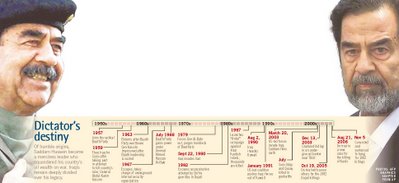Saddam verdict won't end spiral of violence

Religious and sectarian passions have taken over and are tearing Iraq apart
AMMAN - THE future of Iraq may depend little on whether Saddam Hussein hangs.
The Sunni insurgency is so deeply entrenched and sectarian bloodlust so strong that the spiralling violence in Iraq seems set to continue - regardless of its former president's fate.
Some fear that the Saddam verdict, by angering the Sunni minority, could intensify the violence once a curfew in Baghdad is lifted. Others say they hope the verdict gives Iraqis a chance 'to unite and build a better future', in the words of US Ambassador Zalmay Khalilzad.
But in the end, Saddam's fate is not what is driving the violence in Iraq now. Instead, religious, nationalistic and sectarian passions have taken over and are tearing the country apart.
Even if it causes a spasm of violence, Saddam's verdict is just a symbol of the deeper, underlying problems. Sunnis are alarmed at the prospect of Shi'ite domination. Shi'ites are fed up with attacks by Sunni extremists.
Without an effective government to protect them, both communities have become locked in a murderous cycle of reprisal killings that looks set to continue.
The insurgency started with Saddam loyalists.
But it long ago expanded into a multi-faceted conflict waged by different groups with different goals: nationalists seeking to drive foreigners from Iraqi soil; Sunni militants fearing domination by the Shi'ites; and religious zealots waging a global jihad against America.
The death of Saddam would matter little to religious extremists, for example, willing to sacrifice their own lives for their cause.
Likewise with the civil war. It started when Sunni insurgents began attacking Shi'ite civilians, considering them collaborators with the Americans.
With US and Iraqi forces unable to stop those attacks, Shi'ite militias took the law into their own hands, sending death squads to exact vengeance on Sunni civilians. Since the bombing of a Shi'ite shrine in Samarra last February, sectarian reprisal killings have spiralled out of control, taking the nation to the brink of all-out civil war.
Those conflicts will continue to drive the violence - regardless of what happens to Saddam. Neither the Americans nor their Iraqi partners have found a way to control the warring sides.
Thus, Saddam's execution could turn him into a martyr for some Sunnis, who consider the trial simply a smokescreen for the failures of the Americans and their Shi'ite and Kurdish allies.
'I believe that this trial is politically motivated and not a judicial one,' said hardline Sunni cleric Harith Al-Dhari. 'If Saddam is charged with crimes, then the trial should be postponed until the occupation ends.'
But the fact is that Sunnis are likely to remain unhappy even if Saddam were to live. It is their diminished role in the post-Saddam Iraq that most distresses them.
Saddam also matters, without question, to the Shi'ites: The violence has reinforced the determination of the Shi'ites and Kurds, who suffered immensely under Saddam's brutal rule, to put an end to any chance that the former regime might make a comeback.
In short, until Iraq's communities reach political agreement on the future of their country, chances for peace appear bleak.
And that could take a very long time.
ASSOCIATED PRESS
Comments